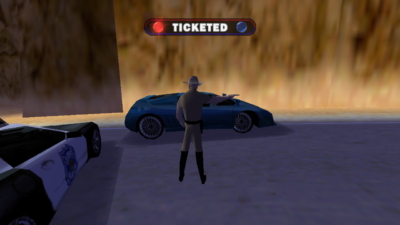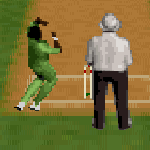Soundtracks is where we talk about licensed music in games. When I Played was a series from a few years ago, about significant games, and times, in my life.
Today we have a strange kind of hybrid/crossover piece, a one-off for a special occasion. Hope you don’t mind.
Nostalgia and happy (or, sometimes, less-than-happy) memories fuse things from different spaces and times together. As someone perennially (and increasingly) out of touch with what is current and modern, my associations are always odd, with decisions to belatedly experience an album, film or game associating them with more modern real-life moments.
For example, I will always associate one particular boozy and chilly Christmas, spent at home without the presence of immediate or extended family, with the game Mass Effect (2008), the album Playing The Angel (2005) by Depeche Mode and the first series of Nordic noir TV series The Bridge (2012). In my head, there’s common ground between them: the chilly climate of real-life Buckinghamshire, a series set in Denmark and Sweden, and an ice planet in Bioware’s space-RPG. Or the synth music of Mass Effect and certain tracks on that Depeche Mode album. But I’m willing to accept that, to anyone else but me, it’s a stretch: these things are not related, and even though each one makes me think of the others, it’s because they’ve been thrown together by circumstance and bonded to each other in time by my brain.
Today, we go a bit further back, to the year 2000, and a time when you could go to the shops to buy physical things: when, for young people with £20 to spend, browsing the shelves of the nearest HMV seemed as good a use of time and money as any. A game released on budget, and a CD that was in a sale: two things that have absolutely nothing to do with each other, except that I bought and experienced them together, at a time that was particularly special to me.
Let’s start with the game first, as that was a purchase that made a bit more sense. (Or did it? The PC that I had with me at university wouldn’t actually run it). But I did like Need for Speed; I knew that Need for Speed III: Hot Pursuit, after a slightly duff second game, was supposed to be good; and that it had recently secured a budget release.
I loved that game at the time. I think it’s probably still my favourite NFS of the portly, middle-aged, Top Gear era (pre-Underground) because it was sort of designed to be enjoyed in short bursts of mucking around rather than via a relentless, competitive (and repetitive) career mode. Sure, you could ‘win’ by beating the cops on a particular track, but it didn’t mean you couldn’t have fun on that same track again, changing up your vehicle, and that of your opponent and making it more or less challenging.
Even getting caught could be fun: it was about the chase as much as anything. And you could forgive a few shortcomings, like the tracks being dressed up as real roads [by ‘dressed up’, you mean ‘wearing Road Trousers‘, right? – Ed.] or the extremely knobby background music. Yes, we were a long way from the licensed smorgasbord later provided EA Trax: there is no ‘proper’ music from the pop charts to be found here, only generic background drum and bass.
Instead, my soundtrack would be the album I bought, which was a classic teenage purchase, of the “I’ve got 20 quid and I am going to spend it, so what can I get for it today” type. Why else would someone buy an album on the strength of a one-hit wonder, when they already owned that hit on CD single? (I’d say that young people should look those things up, but I think it’s likely that there aren’t any here). New Radicals was the band; the single was You Get What You Give, a great pop song that possibly lots of people ultimately found annoying, including New Radicals founder and frontman Gregg Alexander.
You Get What You Give was a 1998 hit in the US, but by the 1999 UK release, Alexander had become bored not just of the song, but also of the band and performing in general: despite being an upbeat summer tune and New Radicals’ obvious technical proficiency, his UK TV appearances were characterised by his habit of pulling a fisherman’s hat down over his eyes in a manner that I characterised at the time as an irritating affectation, but was later revealed to be an attempt to hide his evident disengagement from the material. Though a second single, Someday We’ll Know, was released, the group was disbanded shortly afterwards.
Which was a shame, because (as I discovered upon buying the album, many months after the group ceased to exist) Maybe You’ve Been Brainwashed Too is really good, containing, by my estimation, another six or so other potential singles. And although Alexander gave up performing, he remained successful as a producer, soon turning his skills for pop production to make even the dubious prospect of a Ronan Keating solo career seem mildly palatable. (A number of his singles, particularly 2000’s Life is a Rollercoaster and Lovin’ Each Day, may as well be New Radicals songs). Still, as a public presence he seems to have largely disappeared, although recent-ish interviews have captured a certain willingness to talk about the New Radicals period of his career.
It didn’t come up in any of those discussions, but I doubt that his intention was for his band’s sunnily-eccentric guitar pop to accompany the sounds of police sirens and radio announcements about deploying a spike strip. But those are things with which they will forever be associated with in my mind: a carefree time driving fake cars around in circles. And meeting someone with whom I’ve spent the last 20 years. (That’s probably the important bit).
My wife does not care for the music of New Radicals, and in fact actively disliked some of it (the “Money Please/Soul Please” interlude during album opener Mother We Just Can’t Get Enough in particular). I’m unsure to this day of her position on Need for Speed III, although she did kindly let me play it on her computer, and somehow did not find my request to do so in any way off-putting, but in a manner reflecting my teenage awkwardness and the general sense of shame associated with being interested in computer games at the time, I was too uncomfortable to enjoy the experience and waited until the next holiday break, and the sanctity of my parents’ home, to fully indulge.
Nevertheless, this old game and this old album (how these things can both be old, when the two of us, her especially, are still so young, is another mystery) remain special to me, because they remind me of meeting her; of a time when I stopped worrying quite so much about everything; and, for the first time in my slightly angsty teenage life, of being filled with a sense of optimism that things might actually turn out to be okay.
Happy Anniversary, darling! (note to readers: an actual present and card were of course also provided).




 Posts
Posts
Well, when I read the title of this post, I was rather expecting such a NFSesque title :
https://www.youtube.com/watch?v=ziX_f7rdFD4
instead of references to pop and rock (“Depeche Mode”, I know a little ; “The New Radicals”, never heard about them — must be for British internal market). 😉
As for Mass Effect, this track seems the most moving to me :
https://www.youtube.com/watch?v=FIqHQptIDE4
Nice post. It’s a clever indirect and elegant way to celebrate your wife. Best wishes to both of you.
September 27, 2020 @ 1:17 pm
Thanks RR.
That first link would be to the above-mentioned ‘knobby background music’. Which according to YouTube evidently has a lot of fans!
October 8, 2020 @ 8:32 am